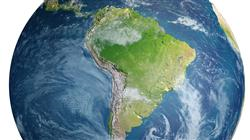University certificate
The world's largest faculty of education”
Introduction to the Program
This Professional master’s degree in Teaching Political Science, Geography and World History in High School will generate a sense of confidence in your daily work, which will enable you to grow both personally and professionally”

The design, aimed at social science teachers, is rooted in reality, favoring holistic and meaningful learning. Special care has been taken in representing motivating learning environments aimed at building a positive attitude towards new knowledge.
The pace, difficulty and complexity of the methodologies used will progress in tandem with the course, as will the assessments, which focus on evaluating evidence of learning at the end of each section and module.
Upon completing the program, teachers will have mastered a sufficiently wide range of activities, tools and contents that will enable them to guide students through the tasks they need, suggest others that can be performed by themselves, and even propose a third group of tasks of a social and collaborative nature.
One of the most relevant features of the program is enabling teachers to define their own instructional designs. They will be able to extrapolate the techniques and methodological strategies used, such as project management; preparing presentations, diagrams and mind maps; creating documents (infographics, maps, audio files, albums, boards, chronological axes, etc); creating educational blogs and wikis; cloud computing and storing of information, and a long etcetera that characterizes the school in the 21st century.
Update your knowledge through the Professional master’s degree in Teaching Political Science, Geography and World History in High School”
This Professional master’s degree in Teaching Political Science, Geography and World History in High School contains the most complete and up-to-date program on the market. The most important features include:
- More than 75 case studies presented by experts in Teaching Political Science, Geography and World History in High School The graphic, schematic, and practical contents with which they are created provide scientific and practical information on the disciplines that are essential for professional practice
- The latest news on Teaching Political Science, Geography and World History in High School
- It contains practical exercises where the self-evaluation process can be carried out to improve learning
- Algorithm-based interactive learning system for decision-making in the situations that are presented to the student
- With special emphasis on evidence-based methodologies in Teaching Political Science, Geography and World History in High School
- All of this will be complemented by theoretical lessons, questions to the expert, debate forums on controversial topics, and individual reflection assignments
- Content that is accessible from any fixed or portable device with an Internet connection
This Professional master’s degree may be the best investment you can make when selecting a refresher program for two reasons: in addition to updating your knowledge of Teaching Political Science, Geography and World History in High School, you will obtain a Professional master’s degree from TECH Global University”
The teaching staff includes professionals in the field of Teaching Political Science, Geography and World History in High School, who bring their experience to this training program, as well as renowned specialists belonging to leading societies and prestigious universities.
The multimedia content developed with the latest educational technology will provide students with situated and contextual learning, i.e., a simulated environment that will provide immersive learning programmed to train in real situations.
This program is designed around Problem-Based Learning, whereby the student will must try to solve the different professional practice situations that arise during the course. For this purpose, the professional will be assisted by an innovative, interactive video system developed by recognized experts in the field of Teaching Political Science, Geography and World History in High School who have extensive teaching experience.
Increase your decision-making confidence by updating your knowledge through this master's degree"
Make the most of this opportunity to learn the latest advances in Teaching Political Science, Geography and World History in High School and improve your students' education"
Why study at TECH?
TECH is the world’s largest online university. With an impressive catalog of more than 14,000 university programs available in 11 languages, it is positioned as a leader in employability, with a 99% job placement rate. In addition, it relies on an enormous faculty of more than 6,000 professors of the highest international renown.

Study at the world's largest online university and guarantee your professional success. The future starts at TECH”
The world’s best online university according to FORBES
The prestigious Forbes magazine, specialized in business and finance, has highlighted TECH as “the world's best online university” This is what they have recently stated in an article in their digital edition in which they echo the success story of this institution, “thanks to the academic offer it provides, the selection of its teaching staff, and an innovative learning method aimed at educating the professionals of the future”
A revolutionary study method, a cutting-edge faculty and a practical focus: the key to TECH's success.
The most complete study plans on the university scene
TECH offers the most complete study plans on the university scene, with syllabuses that cover fundamental concepts and, at the same time, the main scientific advances in their specific scientific areas. In addition, these programs are continuously being updated to guarantee students the academic vanguard and the most in-demand professional skills. In this way, the university's qualifications provide its graduates with a significant advantage to propel their careers to success.
TECH offers the most comprehensive and intensive study plans on the current university scene.
A world-class teaching staff
TECH's teaching staff is made up of more than 6,000 professors with the highest international recognition. Professors, researchers and top executives of multinational companies, including Isaiah Covington, performance coach of the Boston Celtics; Magda Romanska, principal investigator at Harvard MetaLAB; Ignacio Wistumba, chairman of the department of translational molecular pathology at MD Anderson Cancer Center; and D.W. Pine, creative director of TIME magazine, among others.
Internationally renowned experts, specialized in different branches of Health, Technology, Communication and Business, form part of the TECH faculty.
A unique learning method
TECH is the first university to use Relearning in all its programs. It is the best online learning methodology, accredited with international teaching quality certifications, provided by prestigious educational agencies. In addition, this disruptive educational model is complemented with the “Case Method”, thereby setting up a unique online teaching strategy. Innovative teaching resources are also implemented, including detailed videos, infographics and interactive summaries.
TECH combines Relearning and the Case Method in all its university programs to guarantee excellent theoretical and practical learning, studying whenever and wherever you want.
The world's largest online university
TECH is the world’s largest online university. We are the largest educational institution, with the best and widest online educational catalog, one hundred percent online and covering the vast majority of areas of knowledge. We offer a large selection of our own degrees and accredited online undergraduate and postgraduate degrees. In total, more than 14,000 university degrees, in eleven different languages, make us the largest educational largest in the world.
TECH has the world's most extensive catalog of academic and official programs, available in more than 11 languages.
Google Premier Partner
The American technology giant has awarded TECH the Google Google Premier Partner badge. This award, which is only available to 3% of the world's companies, highlights the efficient, flexible and tailored experience that this university provides to students. The recognition as a Google Premier Partner not only accredits the maximum rigor, performance and investment in TECH's digital infrastructures, but also places this university as one of the world's leading technology companies.
Google has positioned TECH in the top 3% of the world's most important technology companies by awarding it its Google Premier Partner badge.
The official online university of the NBA
TECH is the official online university of the NBA. Thanks to our agreement with the biggest league in basketball, we offer our students exclusive university programs, as well as a wide variety of educational resources focused on the business of the league and other areas of the sports industry. Each program is made up of a uniquely designed syllabus and features exceptional guest hosts: professionals with a distinguished sports background who will offer their expertise on the most relevant topics.
TECH has been selected by the NBA, the world's top basketball league, as its official online university.
The top-rated university by its students
Students have positioned TECH as the world's top-rated university on the main review websites, with a highest rating of 4.9 out of 5, obtained from more than 1,000 reviews. These results consolidate TECH as the benchmark university institution at an international level, reflecting the excellence and positive impact of its educational model.” reflecting the excellence and positive impact of its educational model.”
TECH is the world’s top-rated university by its students.
Leaders in employability
TECH has managed to become the leading university in employability. 99% of its students obtain jobs in the academic field they have studied, within one year of completing any of the university's programs. A similar number achieve immediate career enhancement. All this thanks to a study methodology that bases its effectiveness on the acquisition of practical skills, which are absolutely necessary for professional development.
99% of TECH graduates find a job within a year of completing their studies.
Professional Master's Degree in Teaching Political Science, Geography and World History in High School
Social sciences are a fundamental pillar for the progress of citizen culture, for this reason, teachers raise development strategies appropriate to the times and the needs of the student in educational centers. In order to promote professional growth and provide academics with the best tools, at TECH we have designed a Professional Master's Degree in Teaching Political Science, Geography and World History in High School. A postgraduate specialized in addressing events that occurred both in the past and the present that, in addition, reflects on past actions to understand them from a current point of view. Due to the complexity of historical knowledge, you will specialize in using explanatory, comprehensive and propositional models to provide the best preparation for the student. You will also delve into prehistory, ancient history, the Middle Ages, contemporary and modern times. Get certified in the largest School of Education and get better job opportunities.
Take a Professional Master's Degree in Teaching Political Science, Geography and World History in High School
During 1,200 hours you will be trained to acquire the necessary skills and contribute to the improvement of education; this will allow you to strengthen educational systems and achieve benefits for the community involved. As a result, you will become an expert in providing innovative training in this field, which includes mastering space at different scales, reading maps and identifying continents and locations. In addition, you will be able to expose in a didactic way the historical events that have occurred in the world over the years. At TECH we provide you with the necessary tools to highlight your professional profile and expand your field of knowledge. This curriculum was designed with a pedagogical proposal adaptable to current changes, which will allow you to learn in an innovative and efficient way.
Get aProfessional Master's Degre at the largest digital university in the world
At TECH Global University we provide you with theoretical and practical information that will help you to boost your critical development in this area. We have an interactive learning system based on algorithms for decision making in situations posed. For this reason, you will be able to specialize in the teaching of political science, geography and human history.








